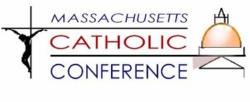Notes from the Hill
Hearing held on physician assisted suicide bill
On Tuesday, Feb. 23, a bill to legalize physician assisted suicide was heard at the State House in Boston. Individuals and organizations testifying against the bill included the Massachusetts Catholic Conference, pro-life organizations, hospice officials and disability advocates. Three individuals testified in favor of the bill after hearing news reports announcing the hearing, but no organizations came forward in support. This marked a change from a hearing held in 1995 on a similar bill that drew hundreds of people to the State House. House 1468, “An Act Relative to Death with Dignity” was filed by Rep. Louis Kafka (D-Stoughton) at the request of a constituent with a terminal condition who has since passed away.
The testimony for and against drew little response from committee members and no immediate action was taken. The committee will have to decide whether to send the bill out of committee with a favorable or unfavorable report, or otherwise place the bill in a study, a move which as a practical matter indicates the bill will likely die in committee. Many expect that, with this being an election year, there will be little appetite in the legislature to move forward on such a controversial issue, especially after similar legislation was defeated in New Hampshire recently.
Nonetheless, the assisted suicide issue will not go away. Go to www.macathconf.org to keep up to date on this and other public policy matters, and to sign up for MCC-Net to receive email legislative alerts.
Here is the text of the testimony opposing the assisted suicide bill submitted by Edward F. Saunders, Jr., Esq., Executive Director of the Massachusetts Catholic Conference:
The Massachusetts Catholic Conference (“Conference”) respectfully submits this testimony in opposition to House 1468, “An Act Relative to Death with Dignity,” filed by request on behalf of a constituent of Representative Louis Kafka. House 1468 would add to the Massachusetts General Laws new language authorizing physicians to provide lethal dosages of medication at the request of patients with terminal conditions seeking suicide assistance.
Assisting suicide is a common law crime in Massachusetts. Current law also treats all persons as possessing lives worthy of protection against harmful intervention, regardless of their condition or proximity to death and notwithstanding the good intentions of those providing the means of death.
By deeming assistance in the suicides of a class of vulnerable persons to be legally permissible, House 1468 contradicts the fundamental guarantee of inalienable rights, the first of which is the right to life. The legislation also would exempt physicians from the duty to do no harm, encouraging the violation of the Hippocratic Oath.
As indicated in a 1995 statement on a similar bill, the Roman Catholic Bishops in Massachusetts are strongly opposed to the legalization of assisted suicide because it is “contrary to the good of persons and contrary to the common good of this Commonwealth.” For “once a society allows one individual to take the life of another based on their private standards of what constitutes a life worth living, even when there is mutual agreement, there can be no safe or sure way to contain its possible consequences.”
The Bishops recognize that “the specter of extreme pain and agony haunts many persons,” but note that “there are many means of palliative care available which will reduce pain in a licit manner.” Legalizing physician assistance with patient suicides “does not offer a legitimate solution” and instead “confuses the issues and renders them more problematic.” Though “(p)hysician assisted suicide may provide what some would call ‘a quick fix’ ... what it proposes in actuality is seriously flawed and ethically intolerable.”
The Catholic Church and its health-related institutions have worked and continue to cooperate with a broad array of organizations and groups seeking to provide life-affirming solutions in the areas of pain management, hospice care and compassionate outreach to vulnerable persons in the face of societal calls to legalize assisted suicide. Earlier this decade, the Massachusetts Catholic Conference joined the Massachusetts Medical Society, the Hospice and Palliative Care Federation of Massachusetts, the Massachusetts Nurses Association, disability rights organizations and other secular and religious entities in the Commonwealth in a coalition formed to educate the public about positive resources for those facing end-of-life decisions. At the same time, the four Catholic dioceses in the Commonwealth implemented a successful statewide educational initiative on end-of-life care called In Support of Life.
House 1468 would turn the commonwealth in the wrong direction by making the law indifferent to whether persons with terminal conditions decide to commit suicide, thus stigmatizing the entire class as not worthy of the state’s full protection and care. With health care costs continuing to rise in Massachusetts, legalizing assisted suicide would exert pressure on state agencies, insurers and providers to recommend suicide assistance to terminally ill patients requiring expensive care. In Oregon, for example, the state has encouraged terminally ill individuals to seek physician assisted suicide; while at the same time the state denies them end-of-life care under Oregon’s healthcare rationing plan.
In view of the foregoing concerns, the Conference urges the Committee to give House 1468 an unfavorable report recommending that the bill ought not pass.
The Massachusetts Catholic Conference is the public policy office of the Roman Catholic Bishops in the Commonwealth, representing the Archdiocese of Boston and the Dioceses of Fall River, Springfield, and Worcester.



















